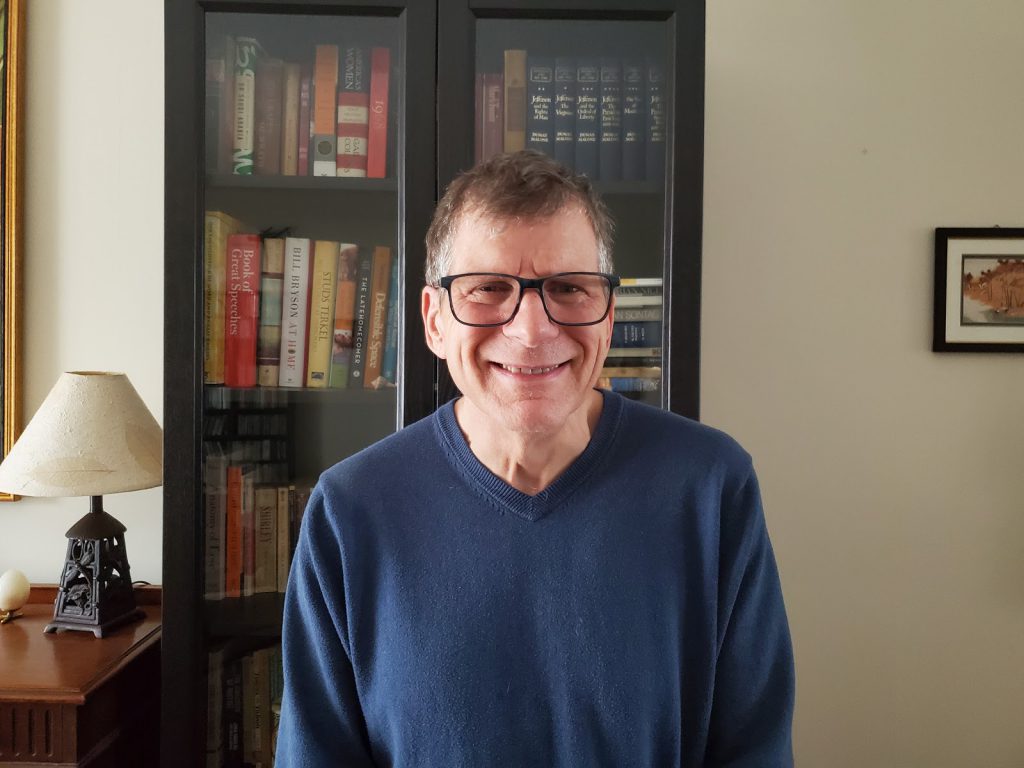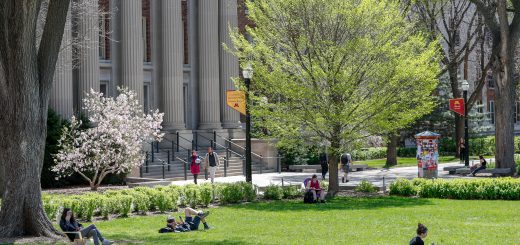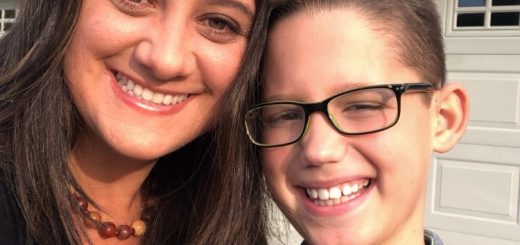Lecture seats for seniors
Minnesotans over 62 take University classes to improve their lives — and maybe teach a few lessons to others.

By Dylan Anderson and Jiang Li
When Ken Holdeman was stumped by a physics problem in 2009, he had an unusual solution: He went back to school.
Now in his 70s, Holdeman could often be found (before campus was shuttered due to a pandemic) discussing that same physics problem with professors on the University of Minnesota, Twin Cities campus.
He is one of more than 500 senior citizens who take classes at the University through the Senior Citizen Education Program. Stemming from a 1975 Minnesota statute requiring state schools to offer tuition-free classes to seniors, the program allows Minnesotans age 62 and older to take courses for credit for a minimal administrative fee — just $10 a credit on the Twin Cities campus.
Minnesota is not alone to offer its regular classes at a substantially reduced rate for seniors, though many programs in other states are school-specific and not mandated by state law. In Wisconsin, those ages 60 and up can audit classes for free at the University of Wisconsin – Madison. In the University of Maryland and California State University systems, tuition is waived for those above age 60 with varying restrictions.
But the Minnesota program gained national notoriety last year when it appeared on “NBC Nightly News” sparking a debate about baby boomers paying so little while the average student pays over $15,000 a year in tuition alone.
Free college advocates like New York Congresswomen Alexandra Ocasio-Cortez championed the idea.
“Wouldn’t it be great if these kinds of educational opportunities were available to ALL seniors, single parents, career-switchers, etc. at, say, community colleges across the country? Such a thing could be possible with tuition-free public colleges and universities,” she tweeted last June.
Others weren’t so pleased. Julie Selander, director at the University’s One Stop Student Services and Veterans Services, said she was surprised to hear negative feedback after the story aired. “I got some quite nasty-grams,” she said.
“Students said ‘where’s my $10 per credit tuition?’” she recalled. “I don’t think they understood that this is something that we have to do based on a state law and not a University policy.”
But Selander said the Minnesota program has generally received positive feedback from both the seniors and their far-younger classmates.
“What I have heard from classmates of senior citizens was that they really added a different perspective on things,” Selander said. “Just a whole different lens on the topic.”
Senior students are eligible to take most classes if they have the prerequisites for them, though some also require them to be part of a particular degree program.
Most of the senior students are not seeking to earn a degree, however. Some of the most popular courses are art courses like pottery. Selander has talked to students who are taking creative writing and history courses to help them write a book.
“What we see for senior citizens is that they are not the type of students that go from semester to semester… so there is not that continuing relationship per se as with other students,” Selander said.
Still, some do take the opportunity to finish their degree. For 70-year-old Barbara Sarapas, that means working on an interior design degree she started at the University in the 80s.
“I’ve met other people. I’ve learned new things. And as a disabled person, I’ve received support from the Disability Resource Center, so I’ve learned to push my envelope a little bit with each class. So, it expands my life in general,” Sarapas said.
Political science Professor Tim Johnson says he has at least one of these older students in each of his classes for the last five years. To him, they often add to the class by sharing life experiences most traditional college students lack. Still, he says, it can present challenges.
“I have had experiences where I’ve got a [senior] student who very much wants to impart wisdom by proving that he or she knows a whole lot more than all the other students, perhaps even knows more than the professor knows,” Johnson said. “They are sort of a ‘I know better than you just because I am older’ type of mentality. That can be a difficult situation.”
While many senior students are there for their own educational development, others say they hope to have an influence on the other students.
Daniel Hunt, a 63-year-old real estate business owner, said he enrolls in classes to challenge college students’ liberal ideology, hoping to expose them to conservative ideas they may not have considered.
“No discussion is worth having if there’s not tension,” Hunt said. “Having discussions where people are uncomfortable, me or them, is imperative. That’s why I’m there, either for me to learn something or [for] me to say to other people, ‘Here’s what I’ve learned.’”
Johnson said that though he is “not a fan of tension,” he fully welcomes disagreement and strong logical discussion about those disagreements. “That is how students learn best,” he added.
But for most, debate is not the goal when they enroll. It remains the interaction with younger generations. Those bonds can sometimes extend far beyond the classroom.

Nic Baker, 68, has been taking courses since 2014, and says the most meaningful aspects are the intellectual stimulation as well as being with younger people and making friends.
“I made a lot of young friends. I love hanging out with college-age people,” Baker said.
Five years ago, he met freshman Lydia Sadoff in a class. She became good friends with him and his wife, he said.
“She moved in with us for a while,” Baker said. “And she has become one of the most important people in my life, and we [in] hers. I just love young friends. It is just a different perspective. I have met wonderful people in my class.”
Clarification: In a previous version of this story, Nic Baker said the most meaningful part of taking courses at the University of Minnesota is being with younger people and making friends. Baker actually said the most meaningful aspects are the intellectual stimulation as well as being with younger people and making friends.



